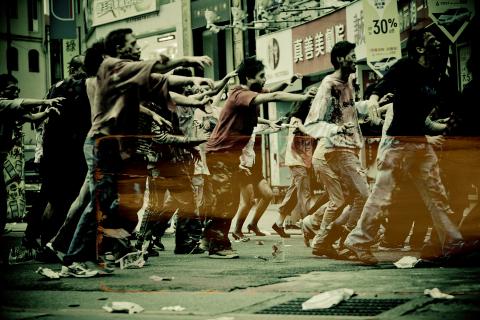Billed as the very first Taiwanese zombie movie, Zombie 108 (棄城Z-108) has generated lots of buzz among horror aficionados both at home and abroad. Nearly 900 people reportedly answered director Joe Chien’s (錢人豪) call to invest in the flick, whose budget clocked in at around NT$10 million. Later, two important players in the genre circuit, the Brussels International Fantastic Film Festival and Puchon International Fantastic Film Festival, picked the movie as part of their lineups this year.
With a more than adequate beginning that recalls many blockbusters of its kind, the self-proclaimed horror B-movie gets off to a good start. Yet the momentum soon dissipates as the movie struggles to flesh out its story.
The film starts with a familiar premise. There is a virus breakout, which is suggested in a sketchy opening sequence. And the next thing we know, Ximending becomes a zombie-infected neighborhood under quarantine. A SWAT team moves in to contain the situation in the seedy downtown area run by local gangs whose obese boss, played by Morris Rong (戎祥), the film’s producer, spends his days surrounded by cocaine and naked women. After a gunfight, the cops and gangsters form an uneasy alliance as they try to survive the flesh-eating undead.

Photo courtesy of Heyshine International
Meanwhile, young mother Linda (Yvonne Yao, 姚采穎) escapes the undead horde with her daughter but falls prey to a pervert, played by director Chien himself, who holds women as sex slaves in his basement.
Eventually, the survivors turn up at the pervert‘s apartment. A Japanese serial killer is thrown in for good measure.
To director Chien’s credit, the zombie assault scenes are well played out. There is also a good deal of gore and blood, though not quite as exciting as many horror fans would expect.

Photo courtesy of Heyshine International
The action sequences are enlivened with parkour and martial arts moves by Taiwanese taekwondo athlete Chu Mu-yen (朱木炎) and martial artist-turned-actor Dennis To (杜宇航) from Hong Kong, both playing SWAT cops. The idea of incorporating extreme sports and kung fu into the fight against zombies has great potential. But the film doesn’t take advantage of this and instead confines itself to a poorly written script revolving around a bevy of mostly dull characters.
The role of women in the zombie action is mostly utilized for torture porn sequences, and the casualness of the sexploitation is hard to stomach.
After making several unsuccessful genre flicks, including Button Man (鈕扣人) and Gangster Rock (混混天團), director Chien seems to be heading in the right direction, into B-movie territory, but he will need to deploy a lot more ingenuity than he shows in Zombie 108 to become a notable filmmaker of trashy movies.

Google unveiled an artificial intelligence tool Wednesday that its scientists said would help unravel the mysteries of the human genome — and could one day lead to new treatments for diseases. The deep learning model AlphaGenome was hailed by outside researchers as a “breakthrough” that would let scientists study and even simulate the roots of difficult-to-treat genetic diseases. While the first complete map of the human genome in 2003 “gave us the book of life, reading it remained a challenge,” Pushmeet Kohli, vice president of research at Google DeepMind, told journalists. “We have the text,” he said, which is a sequence of

On a harsh winter afternoon last month, 2,000 protesters marched and chanted slogans such as “CCP out” and “Korea for Koreans” in Seoul’s popular Gangnam District. Participants — mostly students — wore caps printed with the Chinese characters for “exterminate communism” (滅共) and held banners reading “Heaven will destroy the Chinese Communist Party” (天滅中共). During the march, Park Jun-young, the leader of the protest organizer “Free University,” a conservative youth movement, who was on a hunger strike, collapsed after delivering a speech in sub-zero temperatures and was later hospitalized. Several protesters shaved their heads at the end of the demonstration. A

Every now and then, even hardcore hikers like to sleep in, leave the heavy gear at home and just enjoy a relaxed half-day stroll in the mountains: no cold, no steep uphills, no pressure to walk a certain distance in a day. In the winter, the mild climate and lower elevations of the forests in Taiwan’s far south offer a number of easy escapes like this. A prime example is the river above Mudan Reservoir (牡丹水庫): with shallow water, gentle current, abundant wildlife and a complete lack of tourists, this walk is accessible to nearly everyone but still feels quite remote.

In August of 1949 American journalist Darrell Berrigan toured occupied Formosa and on Aug. 13 published “Should We Grab Formosa?” in the Saturday Evening Post. Berrigan, cataloguing the numerous horrors of corruption and looting the occupying Republic of China (ROC) was inflicting on the locals, advocated outright annexation of Taiwan by the US. He contended the islanders would welcome that. Berrigan also observed that the islanders were planning another revolt, and wrote of their “island nationalism.” The US position on Taiwan was well known there, and islanders, he said, had told him of US official statements that Taiwan had not